Almost three years after his predecessor ended his mission in Bucharest, the new American Ambassador has finally arrived to Romania, this September. Energy was a major focus on H.E. Hans G. Klemm’s first public interventions. The Deputy Economic Section Chief and Energy Officer at Bucharest US Embassy, Kara Aylward, was kind enough to explore with us what are the main challenges in the Romanian energy industry and to highlight some of the points of interest for the American side in relation with Romania.
Dear Mrs. Kara Aylward, we presume that you are well aware that Romania expected an American ambassador for a few years now. What are H.E.’s objectives in Romania concerning political and economic dimensions of US-Romanian relations? Tell us a few actions or programs which US team in Romania intends to continue or pursue to increase the trade relations and technological cooperation between our countries.

Building and maintaining investor confidence is essential for new investments to be made and for existing investments to pay off and expand. To ensure this, both the government of Romania and the parliament must prove reliable partners for all investors both at a policy level and in terms of policy implementation at a company level. As Romania’s regulatory climate still lacks cohesion and long term vision, Romania must tackle this challenge by passing and implementing regulation in a transparent, predictable and stable manner. Continued improvement of, and dedication to, across-the-board consultations with stakeholders would benefit all parties.
With recent Romanian policy making focused on short term priorities, we have engaged the Romanian government, in coordination with AmCham and Fondul Proprietatea managed by Franklin Templeton, in promoting across the board implementation of corporate governance in state-controlled entities (SOEs), to shelter them from political interference and to allow them to operate by the same efficiency and profitability standards as their private peers. We also promote capital market development by reducing costs and bureaucratic barriers and by encouraging the government to continue IPOs and SPOs of state-controlled entities.
We look forward to continue working with President Iohannis, the government, and the parliament on our shared priorities. Ultimately, the US-Romania relationship is strong because of our shared democratic values, our commitment to collective security for our citizens, and our desire to build a shared prosperity for both our countries.
The rule of law and anti-corruption struggle are big issues in Romania, tackled in political speeches, judiciary analysis and investors summits. Under these circumstances, is the local economy still attractive for big business in energy and energy related activities? How high on your agenda is trade missions of US companies in Romania?
Rule of law plays an essential role in improving the business and investment climate in Romania. Companies want to be able to bid on procurements that are not affected by corruption or vested interests. They want economic and business decisions to be based entirely on economic criteria. They need confidence that they can compete on a level playing field and that they can enforce their contracts.
While we do not yet have any concrete plans for trade missions in 2016, we did have a Cybersecurity Trade Mission in May of 2015. We welcome incoming trade mission that help create partnerships with U.S. and Romanian firms.
In the past, US repeatedly insisted on the role Romania should take in the region, in terms of economic and security bridge between Europe and Asia. Today, energy security is the main theme for us all. What is the role Romania should aim at playing in the energy landscape of the region (South-Eastern Europe, Black Sea area)?
Fortunately, due to its domestic energy resources, Romania is better positioned than many of its neighbors from an energy security perspective. The ongoing investments of U.S. companies in the Romanian oil and gas sector have not been affected by the regional political situation. However, it is important that Romania provide an investment friendly business climate to ensure the transparency, predictability, and stability that investors seek when making the decision to initially invest or to increase investments in the country. Romania could be a regional energy hub if it improves the transparency, predictability and stability of its investment climate and the government embraces sound economic decision-making free from political influence when constructing and adopting the National Energy Strategy.
American companies have a low presence in the region in the energy sector. In Romania, Chevron stopped its exploration activities, and other large corporations either have a small presence, or simply are not here. Why do you think this happens? Tell us a few measures that local and central authorities could take to increase the presence of investors in their communities and to level down the disparity between Bucharest and other few cities and the rest of the country?
In general, it is important to remember that official figures from both countries provide only a partial picture of total investment. Many U.S. companies invest in Romania through their European subsidiaries, thus their investment is recorded as coming from the European country in which the subsidiary is located. If we uncouple intermediary countries, probably the United States would be near the top of foreign investors into Romania. According to the Romania’s Trade Registry Office statistics, the cumulative net stock of U.S. FDI from January 1990 to December 2013 totaled USD 50.54 billion.
Judicial, legislative, fiscal and regulatory unpredictability complicate the business environment. The use of emergency ordinances, with little economic impact analyses and consultations with stakeholders, has created major uncertainties and is a disincentive to U.S. and multinational investment. One investment deterring measure is levying taxes on infrastructure in capital intensive industries, including the energy sector.
————————————-
The full version of this article can be read in printed edition of energynomics.ro Magazine, issued on December 2015.
In order to receive the next issue (March 2016) of energynomics.ro Magazine for free, we encourage you to write us at office@energynomics.ro to include you in our distribution list.

